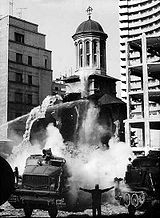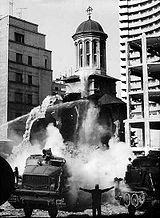
1977 Bucharest Earthquake
Encyclopedia

Balkans
The Balkans is a geopolitical and cultural region of southeastern Europe...
. It had a magnitude
Richter magnitude scale
The expression Richter magnitude scale refers to a number of ways to assign a single number to quantify the energy contained in an earthquake....
of 7.2 with an epicenter
Epicenter
The epicenter or epicentre is the point on the Earth's surface that is directly above the hypocenter or focus, the point where an earthquake or underground explosion originates...
in Vrancea
Vrancea County
Vrancea is a county in Romania, with its seat at Focşani. It is mostly in the historical region of Moldavia but the southern part, below the Milcov River, is in Muntenia.-Demographics:...
(in the Eastern Carpathians) at a depth of 94 kilometres (58.4 mi).
The earthquake killed about 1,578 people (1,424 in Bucharest
Bucharest
Bucharest is the capital municipality, cultural, industrial, and financial centre of Romania. It is the largest city in Romania, located in the southeast of the country, at , and lies on the banks of the Dâmbovița River....
), and wounded more than 11,300. Among the victims was the Romania
Romania
Romania is a country located at the crossroads of Central and Southeastern Europe, on the Lower Danube, within and outside the Carpathian arch, bordering on the Black Sea...
n actor Toma Caragiu
Toma Caragiu
Toma Caragiu was a prolific Romanian theatre, television and film actor.He was born in an Aromanian family, in the Greek village of Aetomilitsa, in the region of Epirus on August the 21st 1925. Toma Caragiu was one of the best Romanian actors, with a rich activity in both film and theatre...
. Nicolae Ceauşescu
Nicolae Ceausescu
Nicolae Ceaușescu was a Romanian Communist politician. He was General Secretary of the Romanian Communist Party from 1965 to 1989, and as such was the country's second and last Communist leader...
suspended his official trip to Nigeria
Nigeria
Nigeria , officially the Federal Republic of Nigeria, is a federal constitutional republic comprising 36 states and its Federal Capital Territory, Abuja. The country is located in West Africa and shares land borders with the Republic of Benin in the west, Chad and Cameroon in the east, and Niger in...
.
About 35,000 buildings were damaged, and the total damage was estimated at more than two billion dollars
United States dollar
The United States dollar , also referred to as the American dollar, is the official currency of the United States of America. It is divided into 100 smaller units called cents or pennies....
. Most of the damage was concentrated in Romania's capital, Bucharest
Bucharest
Bucharest is the capital municipality, cultural, industrial, and financial centre of Romania. It is the largest city in Romania, located in the southeast of the country, at , and lies on the banks of the Dâmbovița River....
, where about 33 large buildings collapsed. Most of those buildings were built before World War II, and were not reinforced. Many of the historic buildings that collapsed were not rebuilt; instead, the land was cleared for the building of the Palace of the Parliament
Palace of the Parliament
The Palace of the Parliament in Bucharest, Romania is a multi-purpose building containing both chambers of the Romanian Parliament. According to the Guinness Book of World Records, the Palace is the world's largest civilian administrative building, most expensive administrative building, and...
. After the earthquake, the Romanian government imposed tougher construction standards.
In Bulgaria
Bulgaria
Bulgaria , officially the Republic of Bulgaria , is a parliamentary democracy within a unitary constitutional republic in Southeast Europe. The country borders Romania to the north, Serbia and Macedonia to the west, Greece and Turkey to the south, as well as the Black Sea to the east...
, the earthquake
Earthquake
An earthquake is the result of a sudden release of energy in the Earth's crust that creates seismic waves. The seismicity, seismism or seismic activity of an area refers to the frequency, type and size of earthquakes experienced over a period of time...
is known as the Vrancea Earthquake or Svishtov
Svishtov
Svishtov is a town in northern Bulgaria, located in Veliko Tarnovo Province on the right bank of the Danube river opposite the Romanian town of Zimnicea. It is the administrative centre of the homonymous Svishtov Municipality...
Earthquake. Three blocks of flats in the Bulgarian town of Svishtov
Svishtov
Svishtov is a town in northern Bulgaria, located in Veliko Tarnovo Province on the right bank of the Danube river opposite the Romanian town of Zimnicea. It is the administrative centre of the homonymous Svishtov Municipality...
(near Zimnicea) collapsed, killing more than 100 people. Many other buildings were damaged, including the Church of the Holy Trinity
Church of the Holy Trinity, Svishtov
The Church of the Holy Trinity is a 19th-century Bulgarian Orthodox church in the northern Bulgarian town of Svishtov and one of the finest examples of late Bulgarian National Revival church architecture....
. In the Soviet Republic of Moldova the earthquake destroyed and damaged many buildings. In the capital Chişinău
Chisinau
Chișinău is the capital and largest municipality of Moldova. It is also its main industrial and commercial centre and is located in the middle of the country, on the river Bîc...
, a panic broke out.
Aftermath
Most property damage was concentrated in BucharestBucharest
Bucharest is the capital municipality, cultural, industrial, and financial centre of Romania. It is the largest city in Romania, located in the southeast of the country, at , and lies on the banks of the Dâmbovița River....
, where over 33 buildings and structures collapsed. Zimnicea
Zimnicea
Zimnicea is a town in Teleorman county, Romania , a port on the Danube opposite the Bulgarian city of Svishtov.-Geography:...
was virtually destroyed, and authorities planned to rebuild it from scratch. The earthquake epicenter
Epicenter
The epicenter or epicentre is the point on the Earth's surface that is directly above the hypocenter or focus, the point where an earthquake or underground explosion originates...
was located in the south-west part of Vrancea County
Vrancea County
Vrancea is a county in Romania, with its seat at Focşani. It is mostly in the historical region of Moldavia but the southern part, below the Milcov River, is in Muntenia.-Demographics:...
, the most active seismic area in Romania
Romania
Romania is a country located at the crossroads of Central and Southeastern Europe, on the Lower Danube, within and outside the Carpathian arch, bordering on the Black Sea...
, at a depth
Depth
Depth may refer to:* Depth , an important invariant of rings and modules in commutative and homological algebra* Depth in a well, the measurement between two points in an oil well...
of about 94 km (58.4 mi). The shock wave
Shock wave
A shock wave is a type of propagating disturbance. Like an ordinary wave, it carries energy and can propagate through a medium or in some cases in the absence of a material medium, through a field such as the electromagnetic field...
was felt in almost all countries in the Balkan Peninsula, as well as Ukraine and Moldova, albeit with a lower intensity. Seismic movement was followed by aftershock
Aftershock
An aftershock is a smaller earthquake that occurs after a previous large earthquake, in the same area of the main shock. If an aftershock is larger than the main shock, the aftershock is redesignated as the main shock and the original main shock is redesignated as a foreshock...
s of low magnitude
Magnitude
Magnitude Is A Part Of An EarthquakesMagnitude may refer to:In mathematics:*Magnitude , the relative size of a mathematical object*Magnitude , a term for the size or length of a vector...
. The strongest aftershock occurred on the morning of 5 March 1977, at 02:00 AM, at a depth of 109 km (67.7 mi), with a magnitude was 4.9 on the Richter scale. Other aftershocks' magnitudes did not exceed 4.3 or 4.5 Mw.
See also
- The Bulgarian film Sweet and Bitter was aired by TVR 1Romanian televisionRomanian television may refer to:* Communications media in Romania* Televiziunea Română, TVR, the national television network* List of Romanian language television channels...
and has remained linked to the earthquake in the mind of Romanians. - On 10 November 1940 another earthquake1940 Vrancea earthquakeThe 1940 Vrancea earthquake also called as 1940 Bucharest earthquake occurred on Sunday, November 10, 1940 in Romania at 03:39 AM local time....
struck Bucharest with a Richter magnitude of 7.4 or 7.7.
External links
- Roxana Roseti, "7,2 grade Richter", Jurnalul NaţionalJurnalul NationalJurnalul Naţional is a Romanian newspaper, part of the Intact media group led by Dan Voiculescu, which also includes the popular TV station Antena 1....
, March 4, 2007

